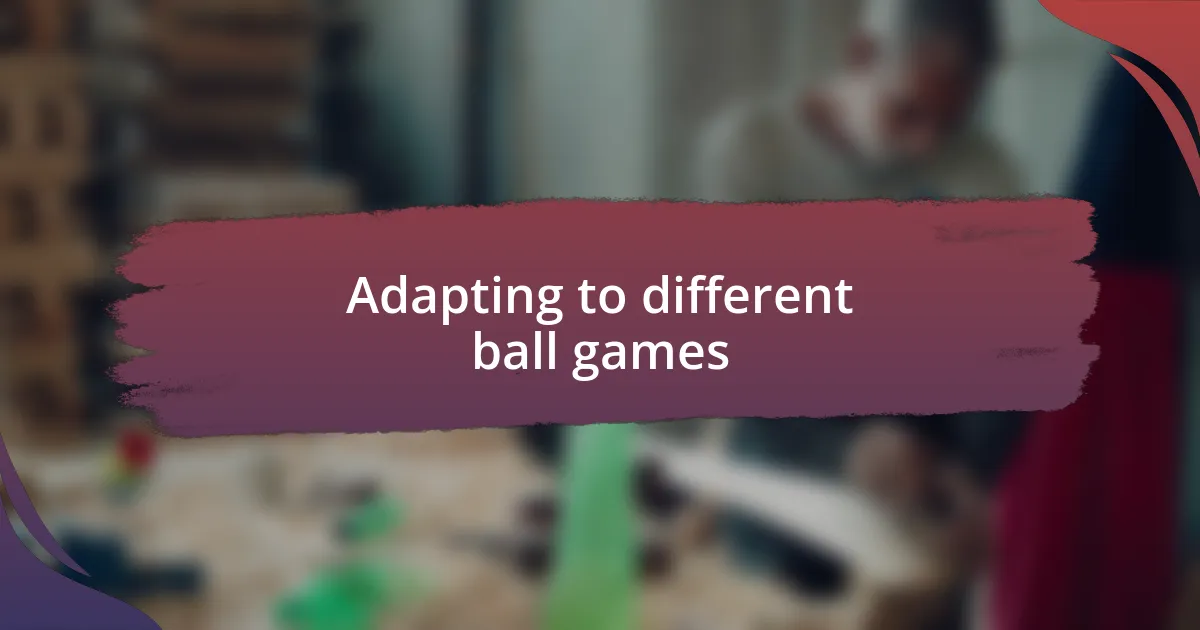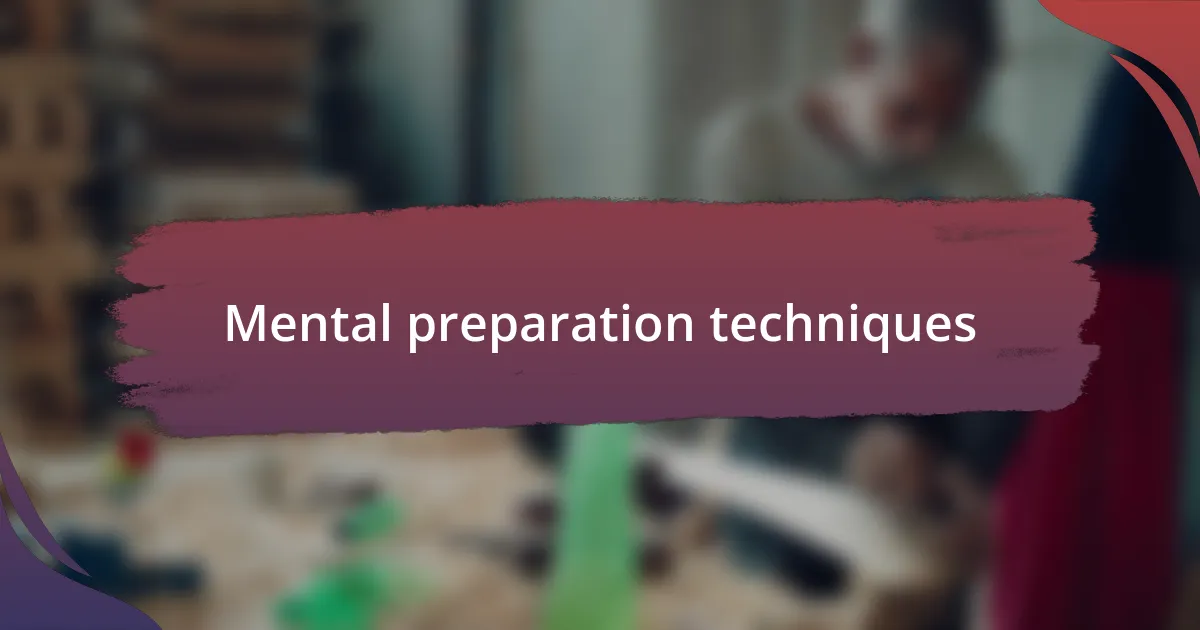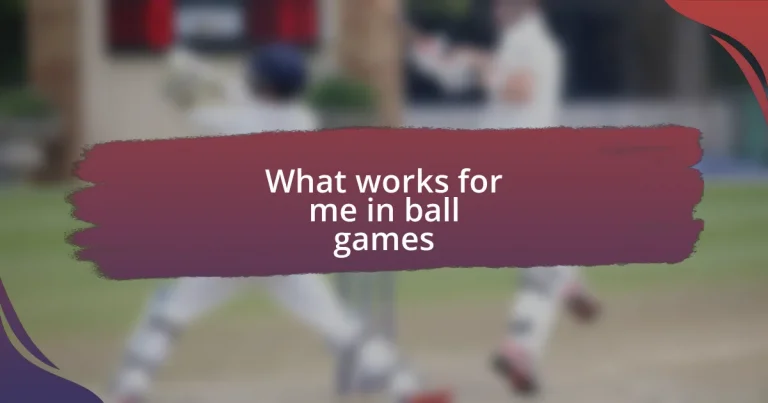Key takeaways:
- Playing style is a blend of instinct, strategy, and teamwork, thriving in high-pressure situations.
- Key skills for success include effective communication, adaptability, and spatial awareness to enhance team performance.
- Strategies for winning involve pre-game planning, developing team chemistry, and analyzing opponents while maintaining a positive attitude.
- Mental preparation techniques like visualization, positive self-talk, and mindfulness improve performance and focus during games.

Understanding my playing style
When I think about my playing style, I realize that it’s a blend of instinct and strategy. I remember a match where I made a split-second decision to pass the ball instead of shooting, and that simple choice led to an unexpected score. Isn’t it interesting how a single moment can define our game?
One thing that stands out about my approach is my love for teamwork. There was a day when my teammates and I were struggling against a stronger opponent. Instead of letting frustration take hold, I shifted my focus to encouraging them, and it transformed our performance. Have you ever noticed how the energy on a team can change with a little positivity?
Emotionally, I thrive in high-pressure situations, which often surprises people. I can vividly recall a tight game where the score was neck and neck in the final moments. Instead of feeling anxious, I felt an adrenaline rush that pushed me to give my best. How about you—do you find that certain situations bring out a different side of your game?

Key skills to develop
To excel in ball games, it’s essential to develop key skills that enhance both individual and team performance. One skill I’ve found crucial is effective communication. During a particularly intense game, I realized the power of a well-timed shout to alert a teammate about an incoming defender. That simple act not only saved us from a potential turnover but also reinforced the trust we had in each other. Have you experienced those moments when a few words can make all the difference?
Another skill that can’t be overlooked is adaptability. In one match, I encountered a strategy that completely stifled our usual plays. Instead of sticking stubbornly to our game plan, we quickly adapted to a more fluid style, which caught our opponents off guard. It’s fascinating how flexibility can shift the momentum in a game. How do you adjust when faced with unexpected challenges on the field?
Lastly, mastering spatial awareness has been a game-changer for me. I often find myself scanning the field, anticipating not just where the ball is, but where it’s likely to go. I remember a time when I intercepted a pass simply because I had a sense of where the play was headed. It’s almost like reading the game before it unfolds. What techniques do you use to stay aware of your surroundings during play?
| Skill | Description |
|---|---|
| Communication | Clearly expressing strategies and intentions to teammates helps streamline actions and decisions. |
| Adaptability | Adjusting your approach based on the game’s flow can lead to unexpected advantages. |
| Spatial Awareness | Understanding the positioning of team members and opponents enhances decision-making. |

Effective strategies for winning
Winning in ball games often hinges on employing effective strategies that resonate well with the team’s dynamics and the game’s rhythm. For instance, I often find that establishing a clear game plan before the match helps everyone understand their roles and responsibilities. I remember a crucial basketball game where we discussed our strategies in detail before stepping onto the court. This preparation enabled us to execute plays seamlessly, and our confidence shone through every fast break and defensive stand. When everyone is on the same page, it genuinely transforms the game experience.
Here are some strategies that have worked wonders for me:
- Focus on Team Chemistry: Developing relationships off the field leads to better understanding during games.
- Set Clear Goals: Establishing specific, achievable objectives helps maintain focus throughout the match.
- Practice Situational Plays: Rehearsing various scenarios prepares the team to respond effectively under pressure.
- Analyze Opponents: Observing the opponent’s strengths and weaknesses allows for strategic adjustments.
- Stay Positive: Encouragement and support among teammates can boost morale and resilience, especially in tough moments.

Importance of teamwork dynamics
Teamwork dynamics are the heartbeat of any ball game. I recall a moment during a soccer match when, after a rough start, we made a collective decision to lift each other up instead of pointing fingers. The shift in our attitude was palpable; suddenly, communication flourished, and we began to anticipate each other’s moves. Isn’t it fascinating how a simple change in mindset can transform performance?
Each player’s unique contribution amplifies the team’s overall effectiveness. I once played alongside a teammate who had a knack for reading the game, often directing us without needing the ball. This synergy not only heightened our gameplay but also fostered an unspoken bond that transcended mere strategy. When you trust your teammates and recognize their strengths, it’s like unlocking a new level of potential.
Moreover, the emotional aspect of teamwork cannot be overstated. During a particularly tense game, our captain encouraged us to channel our nerves into focus rather than fear. I felt the collective energy shift in that moment—support and camaraderie surged, driving us forward. Have you noticed how being part of a cohesive unit can make challenges seem more manageable? In those instances, it feels less like a competition and more like a shared journey toward victory.

Adapting to different ball games
Adapting to different ball games requires a blend of flexibility and open-mindedness. I remember stepping onto the basketball court for the first time after years of playing football. Initially, the pace was overwhelming; however, by focusing on lateral movement and quick decision-making, I started to adjust. Isn’t it intriguing how different sports, while centered around a ball, demand their own specific skills and styles?
As I navigated through various ball games, I discovered that each sport has its unique rhythm. For instance, my experience in volleyball taught me the importance of precise timing and spatial awareness, especially when coordinating with teammates for a perfect set. This fluidity in adapting my approach not only improved my performance but also deepened my appreciation for the nuances of each game. Have you ever experienced that moment when everything just clicks, and you feel in sync with the game’s flow?
Incorporating elements from one sport into another has proven to be a valuable strategy as well. I once played a friendly match of ultimate frisbee, where using concepts from soccer, like positioning and space management, made a remarkable difference in our team’s performance. There’s a certain thrill in realizing that skills are transferable and being adaptable can often lead to surprising victories. How do you adapt your skills when trying out a new ball game? In my case, it has always been about embracing the challenge and learning something new.

Mental preparation techniques
Mental preparation techniques play a vital role in enhancing performance in ball games. Before stepping onto the field, I often visualize the game scenario in my mind. I picture myself in crucial moments, whether it’s making the final shot in basketball or executing a perfect pass in soccer. This mental rehearsal cultivates a sense of familiarity and confidence, almost like I’ve already experienced the game before it begins.
Another technique I find beneficial is positive self-talk. I remember a particularly tense volleyball match where my nerves were getting the best of me. As I stood at the service line, I began telling myself, “You’ve trained for this. Trust your instincts.” This simple mantra shifted my focus and allowed me to channel my energy into the game rather than my anxieties. Have you ever noticed how your mindset can shape your performance?
I also use mindfulness and breathing exercises to ground myself. Prior to any match, I take a few moments to close my eyes, breathe deeply, and center my thoughts. This practice helps clear mental clutter and sharpens my focus. It’s fascinating how just a couple of minutes of being present can transform your approach to the game. What techniques do you turn to when you need mental clarity?

Analyzing performance for improvement
Analyzing performance is essential for improvement in ball games. I often take time after a match to reflect on what went well and what didn’t. For instance, I remember reviewing my shooting percentage after a basketball game. By comparing my actual performance with my training sessions, I could identify specific areas that needed work, making me feel empowered rather than defeated.
Sometimes, I even film my games to get a clear visual of my performance. Watching these recordings reveals nuances I might miss during play. There was a time when I realized I was consistently favoring one side during my serves in volleyball. It was eye-opening to see it in action and allowed me to adjust my technique effectively. Have you ever spotted something about your game that changed everything after reviewing footage?
Feedback from coaches and teammates is another valuable aspect. After a soccer match, I chat with my coach about my positioning and decision-making. Their insights often provide perspectives I hadn’t considered, and I leave those discussions feeling motivated. It’s incredible how collaborative analysis can enhance individual performance, don’t you think?



